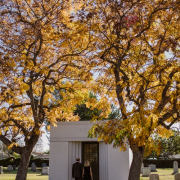How Soon Can I Hold the Funeral Services After Death?
Most adults have attended a funeral at least once in their life. Even those that have not done so may have seen how funerals commence in movies or on television. Most funeral services tend to occur a few days after a person’s demise, whether due to illness or unexpected death.
If you’re planning a funeral service for your deceased loved one, you may be wondering when you ought to plan the services after the death. If you have family living overseas or in other faraway places, you may be considering waiting for them before hosting the burial. How long is a reasonable time frame? Read on to find out how soon you can hold the funeral services after death.
Typical Time Frame of Hosting a Funeral
The average time frame between someone’s demise and the funeral is usually one week or less from the time of death. Funeral directors and their team at the funeral home provide assistance for the bereaved family members. With their expert help, a week is usually enough time to make funeral arrangements and contact surviving family and friends.
When you trace back history, funerals usually happened within a few days of death because of the issue of decomposition. Thanks to embalming technologies, the deceased’s body could be effectively preserved, giving family members more time to prepare for the funeral, make arrangements, and get their affairs in order.
Thanks to technology, families now have a longer leeway to hold a visitation or viewing and pick a specific day to hold a funeral when it is most convenient for the majority of the direct family members and friends who will attend the services. Some families have even held theirs for up to two weeks from the date of death because they have to wait for the next of kin to arrive.
For those who choose to cremate ahead, the family has more flexibility on when to host the memorial because the body is transformed into ashes and placed inside an urn. In this method, the urn and a picture of the deceased are present in the memorial services. Noteworthy, a memorial service can always be held at a later date, whether the body is buried ahead or cremated. Memorial services are traditionally held within one month of death.
Important Details to Remember
Funeral homes are like hospitals in the sense that they’re mostly open seven days a week and provide services throughout the day. Mortuary services are typically open 24/7 because you cannot schedule death and, as crude as it may sound, the reality is any person can die at any given time.
In North America, Saturdays are the most popular day for holding funerals because people are usually free on this day without work or other social obligations. Notably, some cemeteries could charge an extra fee for opening and closing a grave on Sunday. Ask your funeral director for details, especially if you are planning a traditional funeral with a graveside service.
If you choose cremation for the deceased, you can still opt for a simple visitation with the casket or choose direct cremation with no embalming and other rituals to make it more affordable. If you’re the next of kin you need to sign authorization documents for the funeral home to handle the body
Reasons for Delaying the Funeral
In most cases, funerals are not delayed due to how important this event is in the life of the departed and the surviving family members. Most people shift their plans to accommodate the funeral of a deceased loved one. However, some families may have no other choice but to delay the funeral. Again, this is usually a rare occurrence. The primary reason for delaying the funeral service is to allow loved ones from another country or state to fly in so they can pay their last respects to the deceased.
But for the most part, major delays are usually out of the family’s control. For example, there could be police investigations as the cause of death is shrouded in mystery or there could be foul play involved. Other reasons could be that the death happened overseas and the body has to be brought back to the country. Weather disturbances like typhoons, hail, or blizzards may also delay the funeral services. Power outages and a pandemic are also other known appropriate reasons to delay a funeral.
There is No Right or Wrong
Should the deceased have a will or preferred arrangements, it would be easy for you to follow their pre-arranged services. However, if there is none and you are tasked with making arrangements for the deceased, you are at liberty to follow what your family desires. Some families have religious and cultural customs to abide by when it comes to sending off their loved ones in the afterlife.
Making the necessary funeral arrangements for a departed loved one may be daunting, but with the help of an experienced and knowledgeable funeral home, you can accomplish what needs to be done. Working with a compassionate funeral director can help you choose an affordable casket, flower arrangements, or other details, some of which are even available on-site to expedite the process.
Bear in mind that an experienced deathcare team provides the best support and enables you to arrange the best timeline that fits your needs. In making funeral plans, there is no blueprint that says what you’re doing is right or wrong. You have to do what’s best to uphold and honor the spirit of the deceased. At the same time, you also make the best arrangements that assuage the grief of mourning family members and friends so you can all be on your path towards healing and work your way towards accepting your new normal without the deceased.











